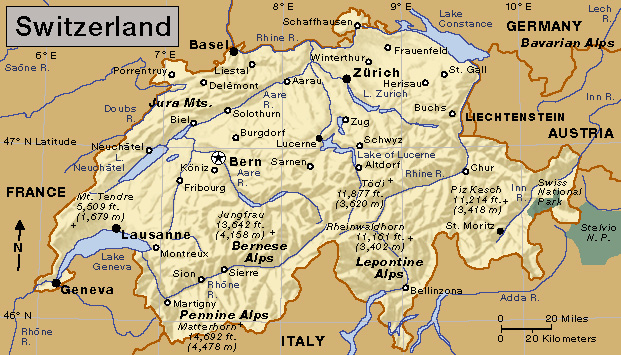Geneva, << juh NEE vuh >> (pop. 203,856), is a historic city in southwestern Switzerland. It lies at the western end of Lake Geneva, where the Rhone River leaves the lake. The French spelling for Geneva is Geneve, and the spelling in German is Genf. Geneva is the capital of the canton (state) of Geneva. It is also a famous international city. Switzerland’s neutrality prevents participation in political and military alliances, but it provides an impartial meeting place for other nations. Many international pacts were worked out in Geneva (see Geneva Accords; Geneva Conventions).

The Rhone River divides Geneva into two sections. The old section lies south of the river. It has narrow, winding streets. Its landmarks include St. Peter’s Cathedral (also called St. Pierre’s Cathedral), begun in the 1100’s; the University of Geneva, founded as a college in 1559 by John Calvin, a leader of the Protestant Reformation; and the town hall, built in the 1500’s. Geneva’s newer section, north of the Rhone, features many hotels and the Palace of Nations. The palace was headquarters of the League of Nations, an international peacekeeping organization that existed from 1920 to 1946.
Many international organizations have their headquarters in Geneva. The Palace of Nations now houses the European headquarters of the United Nations (UN). The International Labour Organization, the International Committee of the Red Cross, and the World Council of Churches also have headquarters in Geneva. Many multinational firms have offices there. The organizations and firms provide many jobs for the city’s residents and its guest workers. Guest workers come from other nations to work in Geneva, and make up about 30 percent of its population. Tourism contributes greatly to the economy. Geneva’s products include expensive clocks, watches, and jewelry.
Roman soldiers established a settlement on the site of what is now Geneva in about 50 B.C. During the A.D. 400’s, Geneva served as the home of the kings of the region of Burgundy. In the A.D. 1000’s, it became a self-governing city of the Holy Roman Empire. During the 1500’s, under the leadership of Calvin, Geneva became a center of Protestantism (see Calvin, John). In 1815, the Geneva canton joined the union of Swiss cantons called the Swiss Confederation.
